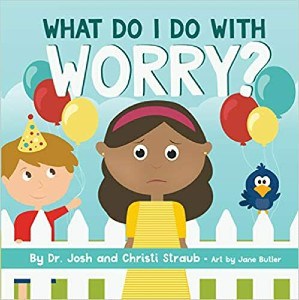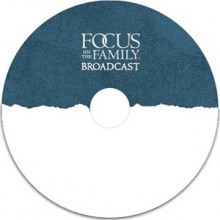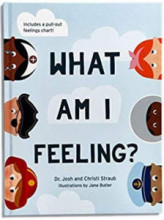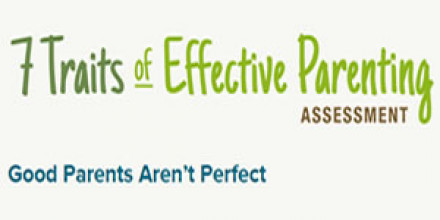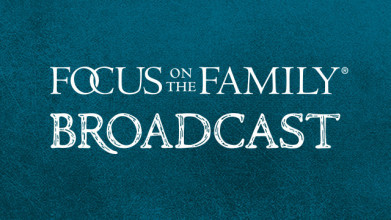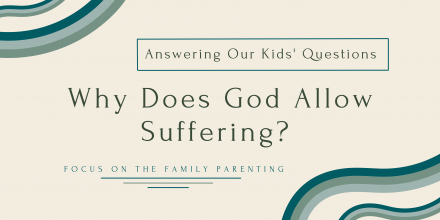Christi Straub: It’s not that we want to prevent our kids from entering these worrisome environments.
Jim: Yeah.
Christi: It’s that we wanna equip them and also give them the language that they know how to handle it.
John Fuller: Christi Straub joins us today on Focus on the Family, along with their husband, Dr. Josh Straub. And together, they’re gonna offer some ways and some tools to help your child manage worry in a healthy way. Thanks for joining us today, your host is Focus president and author Jim Daly, and I’m John Fuller.
Jim Daly: John, every child has worries that come and go, it’s part of growing up. I remember being afraid of the dark and, you know, that, there’s just those common childhood fears. And those are kind of normal experiences, uh, for kids to go through. It’s part of life to have that kind of anxiety. In many scenarios, fear is a healthy response. You want your child to know fight or flight, right? You don’t wanna be in a, the wrong place without thinking, I better get out of here. So it’s not bad. Uh, today, we’re gonna offer some advice so you can equip your to manage fear in a healthy way, not to eliminate it. And mom and dad, let me tell you if you’re trying to eliminate fear, you’re, you’re not going about it in the right way. You need to equip your children to manage that fear.
John: And our guests have a great little book called, What Do I Do with Worry? And, uh, it’s a kid’s book that has some great principles in it. Uh, get your copy at Focus on the Family. Uh, it’s Dr. Josh and Christi Straub, as I mentioned. They’re popular broadcast guest and they co-founded Famous at Home, which trains leaders in emotional intelligence and promotes healthy families.
Jim: Josh and Christi, welcome back. It’s so good to see you.
Christi: Thanks for having us. We love to be here.
Dr. Josh Straub: Yes. Always an honor.
Jim: What a great, uh, theme? You know, we’re, we’re kind of coming out of a turbulent time-
Christi: Yeah.
Jim: … with the pandemic and all.
Christi: Yeah.
Jim: And, uh, let’s start there. Um, that fear that children are feeling right now, generally.
Christi: Mm-hmm.
Jim: Um, how do you go about parenting that?
Dr. Straub: Yeah. It’s a big, loaded question. And I think, you know, one of the most important factors is being able to look at identifying in your children, maybe, um, changes in behavior, patterns that have changed over time in your children’s behavior. And, and, and this is where we have to become students of our kids-
Jim: Mm-hmm.
Dr. Straub: Because every child is different, and every child manages their emotions differently. For example, you might have some children who just withdraw, and they, they go into hiding. You know, it’s, like, they, they become more quiet. Uh, other kids might be on the other end of the spectrum, and they start acting out. And you, you think that it’s behavioral. You think that they’re being defiant.
Christi: Mm-hmm.
Dr. Straub: You think that they’re, uh, you know, disrespecting you, when the reality is, is that underneath that there’s something deeper going on. And then most of us, I think in the middle of this is you might just start seeing, you know, changes with school, changes with the way that they’re interacting with their, you know, uh, peers at school, grades, uh, the schoolwork, and, and they withdraw. And so there’s a lot of different ways, but you have to be able to, and I think this is where as parents, we have to become students of our kids to kind of pay attention to that. And in the busy world that we live in, we as parents also have those fears.
Jim: Right (laughs).
Dr. Straub: So, you know, you’re asking how, how, as parents, how do we, how do we parent this? Um, ultimately, we can get to this. I think it starts with us as parents. We have to figure out how to be managing our own fears so that we are not, uh, superimposing, our own fears onto our kids.
Jim: Boy, that’s so true. Christi, uh, your son Landon, was starting a new school. And he wasn’t acting like himself, completely understandable. All the-
Christi: Yeah.
Jim: … anxiety of having to make new friends, and what will people think of me? I mean, I can get that. I went to seven different elementary schools-
Christi: Oh, wow.
Jim: … growing up, in six years. So, I mean, so I get that-
Christi: Yes.
Jim: … transition anxiety.
Christi: Yeah.
Jim: I think it did help me to be more of a people person, ironically.
Christi: Mm-hmm.
Jim: ‘Cause I had to make friends. You know-
Dr. Straub: Mm-hmm. Yeah.
Jim: Every year was a new class, a new school. And, uh, but speak to your son Landon’s anxieties. How did, how did you figure out what was going on underneath the surface?
Christi: Yeah. And I think Jim, like, just like you’re saying, I think often we look at worry as if it’s this big, scary thing. Even as parents, we don’t wanna see it in our kids.
Jim: Right.
Christi: Like, we want them to walk in, be confident, you know. You know who you are. We’re trying to establish, you know, who they are in God, and right (laughs), and, and this identity in them, but worry is just a normal part of life.
Jim: Mm.
Christi: Like, we have to understand as parents, if we have a fear anxiety or a worry script going on in our own heads, when we see it in our kids, we feel it magnified. It feels worse to us. For a child, they could just be experiencing a normal fear. Going to a new school, that’s a normal worry. Like, and also, it’s building in us things like you’ve just said, you learned how to adapt in social situations. It’s not that we want to prevent our kids from entering these worrisome environments.
Jim: Yeah.
Christi: It’s that we wanna equip them and also give them the language that they know how to handle it. And so for Landon, when he started going to the school, we noticed it was, it was coming out behaviorally. And so you will see, like, sometimes, and we talk about in What Do I Do with Worry? What ifs, right? Where, the question always starts, it’s what if, and it’s where our minds start spinning, and we go down, you know, the end of the, the road of like, well, what if, what if the teacher doesn’t like me? Or what if I don’t have friends? Or what if I walk in and I, I forget that kid’s name? What if I don’t have anyone to sit with at the lunch table? And if, if we don’t pay attention as parents, you start to realize our kids, and so often I think, their worries are not what we assume them to be.
Jim: Right.
Christi: They’re actually very different-
Jim: Right.
Christi: … than the things that we might assume they’re worried about. And that’s where, like, Josh is saying, it’s just being a student to be, and to lean in and to just ask the right questions, to get beneath it really.
Jim: Yeah.
Christi: Because for Landon, we realized some of those insecurities for him were so, I mean, you almost wanna laugh in, in some ways-
Jim: Sure.
Christi: … at what some of the, the fears are.
Jim: Well, and one of the things you’re stressing, I wanna stress even further being that student of your child. Um, I think that’s so critical. And in our adult busyness, you know, we, we can go right by that, and we just think it’s behavioral. And then we respond to that, you know, go to your room for the next hour or some kind of disciplinary issue
Christi: Mm-hmm.
Jim: And we’re really missing the deeper cry of our child’s heart.
Christi: Right.
Dr. Straub: Yeah.
Jim: And that, that then can set you up-
Christi: Yeah.
Jim: … for disastrous relationship with your kids.
Dr. Straub: Yeah.
Jim: ‘Cause then they’re, they’re not knowing if they can trust you.
Christi: Yeah.
Jim: And even if they can’t articulate it, you, you have to be the adult to say, okay, let’s talk about this. What are you feeling? What’s going on in your life right now?
Christi: Yeah.
Jim: But it takes time to do that. You gotta slow down and talk.
Christi: And I think too, we can’t be afraid of what we’re gonna find.
Dr. Straub: Hmm.
Christi: I think so often parents ignore it because we’re afraid of what’s going on underneath.
Jim: Well, certainly by age.
Christi: Yes.
Jim: I mean, you have that conversation with a teenager-
Christi: Yeah.
Jim: … it’s different than with your five-year-old.
Christi: Exactly.
Jim: Let’s talk about that.
Dr. Straub: Yeah.
Jim: What are some of those signs that you see by age and stage, if I could say it that way, you know, in a five-year-old, what are signs? Maybe then a 10, 12-year-old and then a 15-year-old.
Dr. Straub: Yeah. Great question. And I think, you know, um, and I wanna speak to this even as adults because how, how we manifest fear as adults too, you know, ’cause-
Jim: (laughs) Yeah.
Dr. Straub: … it’s, it, developmentally, you know, it goes on.
Jim: Well, these are… Let me ask you, I mean-
Dr. Straub: Yeah.
Jim: You’re a PhD, these are patterns that are developed in your childhood-
Dr. Straub: Yeah.
Christi: Mm-hmm.
Jim: … that you will carry into adulthood-
Dr. Straub: A hundred percent.
Jim: … if you’re not taught or you don’t learn-
Dr. Straub: When we suppress emotion-
Jim: … how to manage them.
Dr. Straub: You can’t suppress, you know, it’s, it’s interesting, uh, Solomon wrote this in Proverbs 24, he said, uh, patience is better than power and controlling one’s emotions than capturing a city.
Jim: Huh.
Dr. Straub: You know, and the idea there is, if you can’t identify your emotion-
Christi: Mm-hmm.
Dr. Straub: … you know, it’s gonna have control of you.
Jim: Right.
Dr. Straub: And so, you know, it doesn’t mean that, you know, I think as parents were so afraid, as Christi was saying earlier of what’s really gonna come out.
Christi: Mm-hmm.
Dr. Straub: And it’s like, oh, if we ask, we’re gonna lose control over it. And the reality is, if you don’t ask is when you’ll lose control over it.
Jim: Good.
Dr. Straub: Because we suppress, we deny.
Jim: Yeah.
Dr. Straub: Uh, or we repress these emotions, that’s when it gets dangerous in us, as adults, as children. And I think what’s interesting today is, is, and again, just becoming students of your children, the danger is, especially as you hit those teenage years, you know, in five-year old’s, uh, you know, preschoolers, you can see it behaviorally. You could see it, you know, as I mentioned earlier, withdrawing. Um, you know, maybe there’s some changes in social situations, but as you get up been to those 10, 11, 12, and teenage years, what we’re doing now is finding is, you know, screens are a major problem-
Jim: Right.
Dr. Straub: … as it relates to how we suppress emotion. Even as adults, you know, we turn to screens instead of being able to sit with our emotion and be able to experience our emotion, we use screens to numb it out. And I think, especially in those preteen years, games, uh, video games for boys, this is generally speaking, but video games for boys typically, and then social media, uh, for girls and the idea of building social relationships. Uh, those preteen years are really, really-
Christi: Mm-hmm.
Dr. Straub: … difficult years, uh, for teenage girls trying to find where do they fit in relationships. And, and, and so if we, as parents aren’t paying attention, or we’re just giving them the screen and letting them kind of do their thing, we’re building a wall between our heart and their hearts.
Jim: Right. Well that, and that’s the next question I wanted to ask you. What our kids see in us as parents?
Christi: Mm-hmm.
Jim: Right?
Christi: Yeah.
Dr. Straub: Yeah.
Jim: And, you know, sometimes I’m feeling good about that analysis.
Christi: (laughs).
Dr. Straub: (laughs) Yeah.
Jim: And other times I’m feeling like what damage have I done?
Christi: Yes.
Jim: And in this area of worry, particularly we, as parents can be demonstrating worry without even knowing it.
Christi: Mm-hmm.
Jim: And our kids are picking up on it. If mom and dad are worried-
Christi: Yes.
Jim: … I should be worried.
Christi: Yes.
Dr. Straub: Mm-hmm.
Jim: So speak to that, modeling-
Christi: Mm-hmm.
Jim: … that, especially as Christians, you know, fear not.
Christi: Yeah.
Dr. Straub: Mm-hmm.
Jim: Um, I give you your spirit of peace.
Christi: Yeah.
Jim: I mean, that’s what the Lord’s expecting-
Dr. Straub: Mm-hmm.
Jim: … out of our relationship, that we have ultimate faith in him to control and be in every circumstance-
Christi: Mm-hmm.
Jim: … that we find ourselves in.
Dr. Straub: Yes.
Jim: But sometimes we fail-
Christi: Yeah.
Jim: … trusting in that.
Christi: Mm-hmm.
Jim: And then our kids are watching too.
Christi: Oh, exactly. I mean talk about, like, love, power, and a sound mind, right? But what does a sound mind look like? And obviously we’re not gonna get that right all of the time. And I think that’s the, the beautiful thing, if we can see it through a lens of grace for ourselves. And maybe, you know, even as you’re listening, you could probably put yourself on a scale 0 to 10, well, how big, for example, we’re talking about worry specifically today. So for worry, how loud is that volume in your life?
Jim: Hmm.
Christi: Because for those of us who, it’s not as loud for me personally, but for those parents who maybe they’ve struggled with anxiety-
Dr. Straub: It’s louder for me.
Christi: It’s… I wasn’t gonna, like-
Jim: (laughs).
John: (laughs).
Dr. Straub: (laughs).
Christi: … throw you under the bus.
Jim: She was waiting for you to jump in.
Dr. Straub: That’s very nice of you.
Christi: I was just waiting for you to volunteer that. But, um, and yes, and so it’s true. And so based on that, though, you are gonna be so much more heightened to seeing that in your child. And just, that’s no condemnation, it’s just being aware of. So if you’re aware that worry is louder for you, just recognize that how you deal with it is, um, it, it’s not just your personal practice, it’s your ability to share that gift with your kids. So-
Jim: Oh, and their eyes are wide open. They’re watching you.
Christi: And they’re wa- and they’re watching you.
Jim: Yeah.
Christi: And you don’t have to do it perfectly.
Jim: Yeah.
Christi: I remember one time my daughter came home and again, at least for her, and what we often see for girl’s social situations-
Jim: Mm-hmm.
Christi: For boys as well, but for girls, they’re so attuned to social cues, but again, don’t have the tools to know how to engage as they’re growing up. And so for her, a lot of worry comes around social situations. And I remember telling her a story when I was in first grade. And I went out to the recess playground, and I walked over to this group of girls. I remember it like it was yesterday. They were standing along this fence line. And I walked up, and I just thought I would just be able to play with them, you know. And I just walked up, and this girl comes out like a bouncer (laughs).
Jim: (laughs).
Christi: And she says to me, “What’s on your zipper?” And I’m like… And I grew up in Canada, right? So we’re, like, wearing coats all the time.
Jim: (laughs)
Christi: So I’m like, “On my zipper, what?” And so if you didn’t have the letters, YYK on your zipper, you weren’t allowed to play with them.
Jim: That was the YYK club?
Christi: Yes.
Jim: (laughs) I see.
Christi: And I remember, I just, like, in that moment, like, it was the first time I experienced true rejection.
Jim: Right.
Christi: And I realized I have no control.
Jim: Interesting.
Christi: Like, I don’t set the rules.
Jim: Wow.
Christi: There’s these arbitrary set of social rules that I don’t know.
Jim: Hmm.
Christi: And someone else gets to tell me whether I’m included or not. And I remember walking away and just that imprinted something on me so that every time I entered a social situation as a kid, even up through high school, college, even into adulthood, that trigger of that wound is like-
Jim: Hmm.
Christi: … do I, I, I don’t know if I’ll be accepted here.
Jim: Wow.
Christi: And so if you think about that for our kids, I mean, on the playground, first grade, I, I remember sharing that story with my daughter. And I, it was like, her eyes got so big to realize, oh, it’s not just me.
Jim: Hmm.
Christi: Mom, mom feels this too. Mom struggles with worry too. And so, and, and we talk about in the book really practical ways that we can release our worry to God. I, we used it like worry birds. You know, when you talk about that feeling that we feel when we worry, where it’s like, literally feels like your insides-
Jim: Oh, yeah.
Christi: … are, like, flapping around.
Jim: Yeah.
Christi: And that the harder, and the, and the more we try to control and hold on to that worry, and as adults, we can all identify with this (laughs). We try to just look, like, iron grip it, right? And it just makes it worse. It’s, like, literally trying to hold onto this flapping bird. And the Lord is just asking us, just, just present it to me. Like, just lift it up to me, because you can’t handle this, but I can. And so I think giving our kids some really practical tools and just language around, are you holding onto a worry bird right now?
Jim: Hmm. Yeah.
Christi: What, what, what might that look like? And if, you know, if a child is either pre-verbal or just, it’s difficult to, um, put into language, you know, having them draw something that they’re concerned about, all of these things are just ways that we can again, lean into their heart, but also give them tools, so they realize whenever I face this-
Jim: Right.
Christi: … I’m not alone. And nor is there shame around this. ‘Cause you’ll hear in young kids, there’s a lot of questions. Like the what ifs that we talk about. But as they get older, they stop asking so many questions, because there’s this shame component.
Dr. Straub: Mm-hmm.
Christi: And they’re, they’re concerned even as mom and dad, what we’re gonna think of them if they were to ask, what’s really a vulnerable question, um, that this something they’re concerned about.
Jim: Yeah.
Dr. Straub: Yeah.
John: This is Focus on the Family with Jim Daly, and our guest today are Dr. Josh Straub and his wife Christi. And we’re talking about worry, particularly as it relates to your child. But I think there’s application for all of us here-
Jim: (laughs) Yes.
John: … as we deal with emotions and especially worry. And, uh, we’ll encourage you if you’re a parent or a grandparent to get a copy of their great little picture book, What Do I Do with Worry? It’s got all the concepts that Christi was just describing. Uh, stop by focusonthefamily.com/broadcast to get a copy or call 1800, the letter A, and the word FAMILY.
Jim: Josh, let me pick up on what Christi was mentioning there. You, you, you experienced anxiety as a child.
Dr. Straub: Hmm.
Jim: I guess the right question is what was going on? And speak to that as an adult now, and what that was like and what helped you.
Dr. Straub: Yeah. And it’s interesting because I don’t know that I would’ve identified it, um, as worry at the time, but at 10 years of age, uh, my parents divorced. And I remember my mom coming into the bedroom and you know, she said, “Josh, I’m moving out today. Do you wanna stay here with your dad? Or do you wanna come with me?”
John: Hmm.
Dr. Straub: And, um-
Jim: Wow. That’s pressure.
Dr. Straub: Yeah.
Jim: That’s crazy.
Dr. Straub: 10, 10 years old, and I had never seen my parents argue. I’d never seen my parents fight. And so later on that afternoon, you know, there’s this exchange in our driveway because my dad comes home and you know, he’s seeing his world come crumbling down. My mom’s moving out. And there was an exchange there for me as a firstborn, there was an exchange there where I looked at my dad and I said, I’m staying here with you. And, and I didn’t say this, but it was as if I was saying, I’m gonna take care of you.
Christi: Mm-hmm.
Jim: Mm-hmm.
Dr. Straub: I’m gonna, you know, this is, uh, hard. And so as a result, what ended up happening then, and then at 19, and today I have an amazing relationship with my mom. She and I have reconciled so much through the years. She’s incredible, incredible grandma and, and, and everything. But for me having to reconcile that, and then at 19, I found out that, uh, or my dad’s second wife left him, and she took everything. And so I go out, and, you know, I’m working landscaping while I’m in college. And I go out and I take care of him and buy all the furniture and everything to get him back on his feet. And it’s like, there was this me taking responsibility, uh, more than I needed to for other people.
Jim: Yeah.
Dr. Straub: And that transferred over. I didn’t really feel it until we had a family and, and, uh, I was crashing and burning. I was taking on all these responsibilities, and I’d work really hard, and then I’d crash and burn. And it was fascinating to me how this pattern, uh, when I entered therapy, was it took me back to that driveway scene.
Jim: Yeah.
Dr. Straub: It took me back to that very moment where I realized all this responsibility I was hanging onto, went back to there, and the anxiety that I was feeling about, you know, making sure everybody was okay, and that I was, you know, I became a people pleaser.
Jim: That you were responsible.
Dr. Straub: That I was… Yeah. And-
Jim: Yeah.
Dr. Straub: And that people were okay with me.
Jim: Yeah.
Dr. Straub: And that we were, and this anxiety about people will abandon me if I’m not, you know-
Christi: Hmm.
Dr. Straub: … dancing in relationships really well. But even today, this is where parents, I think we become the most profound therapist for our kids in our home.
Jim: Yeah.
Dr. Straub: Because neurobiologically, what’s going on is what happens to us, the worry that we’re feeling is happening in the right side of the brain. The left side of the brain is the linguistic language part of the brain. It’s already put language to what it is we’re experiencing. And our ability as parents, as Christi was saying earlier, to get our kids to label what they’re feeling, to draw what it is they’re feeling, is what marries the right and left side of the brain together to help them tell their story. And, and, and Paul talks about this in Philippians 4, which I think is amazing. I mean, neurobiologically, he understood how a brain worked when he said be anxious for nothing, but by prayer and supplication with thanksgiving, make your request known to God and the peace of God, which surpasses all understanding will keep your hearts and your minds in Christ Jesus. What he’s saying there is go to God with your worry.
Christi: Mm-hmm.
Dr. Straub: With Thanksgiving and gratitude that he’s gonna show up for you.
Jim: Yeah.
John: Mm-hmm.
Dr. Straub: And label it to him.
Jim: Well, I, I so appreciate the way you’re balancing that, because some listening are going, okay, you know, we’re talking a little bit about psychology.
Christi: Mm-hmm
Jim: They get a little uncomfortable with that, but really any science is unfolding God’s creation.
Christi: Yeah.
Jim: And as Christians, that’s how we need to look at it.
Christi: Yeah.
Jim: It’s not some mystery. I mean, it, science will, I think, unfold the truth of God’s creation, right?
Dr. Straub: Well, and I think, I mean, this is where I see fear and worry as being a gift, you know. That worry can be used as a way to build intimacy. You know, and scripture says that the fear of God is the beginning of wisdom.
Jim: Huh.
Dr. Straub: Worry helps us to understand who we can trust in life. Worry helps us to understand how to be vulnerable with the right people. And if we negate that, the opposite is moving to anxiety. Like, I was doing where I’m dancing in relationships, maybe withdrawing, not engaging, not partnering with people, ’cause I’m afraid, or you might hurt me.
Christi: Hmm.
Dr. Straub: So we put walls up. Whereas if we can tap into fear in a healthy way, and worry in healthy way, it leads us to intimacy in relationships.
Christi: Mm-hmm.
Dr. Straub: The awe and wonder of God, who’s showing up and saying, I’ve got you. I love you. You have nothing to fear because I am with you. It’s the beginning of wisdom as adults, but also, we help our children understand, you can walk in the ways of the Lord. And this leads to intimacy. Use your worry in a healthy way, and-
Jim: Yeah.
Dr. Straub: .. you’re set up for intimacy-
Jim: No, it’s so true.
Dr. Straub: … for your life.
Jim: Let’s, uh, we’re right at the tail end, but I, let’s get into the book a little bit further. Uh, your books about a little girl named Willow. Uh, give us the overview of the story and what kids will read with their parents when they get a copy.
Christi: Yeah. Well, Willow, she’s moved to a new neighborhood, and obviously as we experience change in our life, it just mounts up a whole bunch of worries. Um, and that’s normal. If you’re afraid for your kids, I think, especially with the environment of the world right now, and in the examples that we used in the book where she’s, her grandma comes in and she’s helping her process. She’s worried, she doesn’t know what to wear. Will the kids, um, you know, will they accept her? Will she make friends? And so grandma walks her through, even just sharing her own stories, how to release her worry words to God, how, how she can draw and the things that she can do every time she faces a worry, ’cause your life will never be devoid of it, but you have the tools. And really, she walks out and she’s brave.
John: Hmm.
Jim: Yeah. And it’s a great read. And what it does is facilitates that dialogue.
Christi: Yep.
Jim: And gives you the tools as a parent or maybe a grandparent to be able to know, uh, kind of the course you’re going with your kids.
Christi: Yep.
Jim: So, you know, there’s a purpose.
Dr. Straub: Mm-hmm.
Jim: And, you know, where you’re headed. Let me, uh, bring in, you know, we’re in a kind of that post pandemic or nearly post pandemic environment, all of the research that we’re seeing with the heightened anxiety in children, because of what’s been happening.
Christi: Mm-hmm.
Jim: I mean, do I go to school with a mask? Without a mask? And how do I, how do I behave as a third grader? I mean, there’s a lot more on children today in a very destabilized environment.
Christi: Yeah.
Jim: Um, I think I read something from the CDC where anxiety is up in, you know, significantly 25%-
Dr. Straub: Mm-hmm.
Jim: … of those 14 to 24 have suicidal ideation.
Christi: Yeah.
Dr. Straub: Mm-hmm.
Jim: I mean, we need to be paying attention to our kids are right now, ’cause they need us.
Dr. Straub: Yeah. The idea of isolating is just, it’s not, you know, we were designed for relationship. We were designed for community. Even there’s a study out of Brown University that found that, you know, verbal, social and cognitive, uh, development is being stunted in children born during the pandemic, because when adults wear masks, you know, children learn to speak by watching your, your, they read your lips.
Jim: Your lips. Right.
Dr. Straub: They literally watch your lips. And, and, and children learn emotional expression in facial cues all the way up to age 12. And so we’re seeing this developmental delay, speech delays, uh, and I think we’re gonna continue to see that. And, and it’s difficult because these parents were in a world where it’s like, okay, we’re, we’re trying to manage illness. We’re trying to manage and make sure that we’re staying healthy,
Jim: Maybe elderly parents.
Christi: Yeah.
Dr. Straub: Elderly parents, you know. And so we gotta, we want to manage really well and be wise about how we’re navigating the world around us. But at the same time, we also know that some of the ways that we do that are also hindering. And so it’s like, how do we balance that? And I think it really begins with us as parents. We’ve got to be able to find someone we can talk to.
Christi: Yeah.
Dr. Straub: We’ve got to limit our, the, the news sources, the, the, the fear that comes in through news sources. We’ve gotta limit that around our kids. You know, of course it’s important to watch what’s happening in the world. But if you don’t have a way, if you don’t have an outlet for yourself as a parent, as an adult, that will come back into you, whether you realize it or not, there is a trickle-down effect of fear in your home from you, the parent. And so I think it starts with us, the parents. I think we’ve got to be able to have people we can talk to before we talk to our kids about it.
Jim: Yeah. No, that’s so good. I’m thinking of, uh, Jean, my wonderful wife who once said to me, ’cause I’m, you know, I’m in the role here at Focus. I know things are going on in the culture. I’m reading a lot of reports that come to me.
Christi: Mm-hmm.
Jim: And so I’d come home and, you know, I’d be talking with Jean about it or the boys maybe at dinner saying, “Hey boys, what do you guys think?” And Jean had to say, you know, Jim, you might, you might wanna-
Christi: Yeah.
Jim: You know, I think you’re filling the kids with fear-
Dr. Straub: Hmm.
Jim: … talking about all the wrong things that are going on in the country right now.
Dr. Straub: Yeah.
Jim: And that did, that helped me to arrest, uh, my overzealousness (laughs).
Christi: Yeah.
Jim: ‘Cause the kid were, they’re like, there’s no hope in that.
Christi: Yes.
Dr. Straub: Yeah.
Jim: And I think that’d be a great caution for a lot of Christian parents right now.
Christi: Yes.
Jim: With all of the things going on, we’ve got to allow the idea that the Lord is in control here everybody.
Christi: Yes.
Dr. Straub: Well, and if I can say like, I just think now is that opportunity more than ever for us to, as, as adults to, and Christians, as Bible believing Christians to experience joy and to show people-
Jim: Right.
Dr. Straub: … hope. I mean if not us, who?
Jim: That’s the difference. (laughs) Yeah.
John: Yeah.
Dr. Straub: I mean truly, and, and to exude that in our home. So we’re huge about the atmosphere of our home, paying attention to the-
Christi: Mm-hmm.
Dr. Straub: … atmosphere of our home. Is it, is, do we experience a spirit of fear or are we exuding a spirit of joy, a spirit of peace-
Christi: Mm-hmm.
Dr. Straub: … you know, by playing worship music or by even the way that we’re interacting with one another and how we’re transferring that to our kids. And so that’s huge because you know, there’s a lot of times I’ll, I’ll ask our kids, you know, what are you worried about? Or what’s going, you know, what are you feeling today? And it might be like, oh, I’m really worried dad, or I’m really sad. And we’re like, you know, inside, I’m going, okay, what’s going on? What’s going on? And then you’re like, oh wow, that’s all that it is. Okay. So, you know, it’s like, I mean-
Christi: Yeah.
Dr. Straub: I’m not minimizing it, but you realize the worries that they’re carrying often aren’t what we think.
Christi: Yeah.
Dr. Straub: And if we lead with what we think it might be, what you’re doing is you’re planting a bigger seed of worry in their brain-
Jim: Right.
Dr. Straub: … than what they’re really worried about. And it’s unnecessary.
Jim: No. I so appreciate that. And it was great that Jean just called me out on that.
Christi: Yeah.
Jim: You guys, this is a great book, What Do I Do with Worry? And what a resource for parents-
Christi: Mm-hmm.
Jim: … to have to help their children at all ages-
Christi: Mm-hmm.
Jim: … to really understand how to manage this life and worry.
Christi: Mm-hmm.
Jim: And I hope, uh, you know, the listeners will get in touch with us to get a copy. And as we often do, let me just invite you into ministry here. If you can make a gift of any amount, uh, if you can do that monthly, that’s great, but a one-time gift works too. And we’ll send you a copy of the book as our way of saying thank you for being part of the ministry.
John: Yeah. Just give us a call. Our number is 800, the letter A, and the word FAMILY, 800-232-6459, or stop by focusonthefamily.com/broadcast. And this reminder that we’re here to be a resource for you. Uh, so please visit our website if you’re not sure how to help your child with worry. Uh, we have help there for talking to your kids about what’s going on in Ukraine and other difficult topics of note. And we have caring Christian counselors, just a phone call away if you’re really struggling with how to best help your child. To set up a time with one of those counselors, stop by focusonthefamily.com/broadcast or call 800-A-FAMILY. Well coming up next time here on Focus on the Family, how one family navigated the tragic loss of their daughter.
Pastor Levi Lusko: And we just began praying that the God who made the sun stand still, who gave Jairus’ daughter back, who raised Lazarus from the dead, the God who brought Jesus out of the grave that he would give her life back and give us more time with her. And God didn’t answer that prayer
John: On behalf of Jim Daly and the entire team, thanks for joining us today for Focus on the Family. I’m John Fuller, inviting you back as we, once again, help you and your family thrive in Christ.












